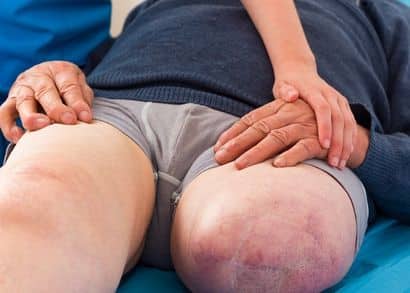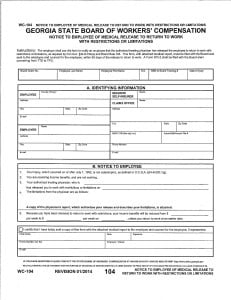Working in a meat-packing plant can be quite dangerous. An article published by the Guardian discussed some of the common dangers faced by meat-packing plant employees.
When you suffer an injury at work, your employer’s workers compensation insurance should pay for the medical treatment you need and the time that you are out of work as a result of your injury. Unfortunately though, many employers and insurance companies ignore, delay, or deny claims for workers compensation injuries.
What types of injuries commonly occur in a meat-packing plant?
Many types of injuries occur in the meat-packing industry. A quick glance at OSHA’s page which covers Hazards and Solutions in the meat-packing industry demonstrates the dangers to which employees are exposed on a daily basis.
There are four specific types of injuries that meat-packing employees suffer at work:
 Amputations
Amputations
Employees in the meat-packing industry work around sharp objects and dangerous machines. As the article mentioned above from The Guardian discusses, two amputations on average were occurring each week in 2018.
In addition to requiring medical treatment, amputation injuries often cause difficulty with returning to work. This is especially the case when the amputation is to the hand or arm because many jobs require the use of your hands or arms for lifting, grasping, and fine manipulation.
Crush injuries
Crush injuries occur frequently in the meat-packing industry. This happens because employees are required to work around dangerous machinery. Sometimes, these machines malfunction. Even when they do not malfunction, accidents can happen and an arm or leg can be pulled into a machine.
Chemicals and other hazardous exposures
Meat-packing employees are require to work around a lot of hazardous chemicals. Exposure to these chemicals can cause injuries to the lungs or other body parts.
In addition to hazardous chemicals, met-packing employees work around many different biological hazards such as bacteria and viruses. Workers in meat-packing plants often use various forms of personal protective equipment (PPE) to minimize the risks associated with exposure to these biological hazards.
Slip and falls
Liquids, biological fluids, and other hazards on the floors can make it dangerous to even walk around a meat-packing plant. Slipping and falling can cause injuries to the back, neck, legs, arms, and head.
 How can I get the medical treatment I need for my workers compensation injury?
How can I get the medical treatment I need for my workers compensation injury?
One of the primary benefits provided under Georgia’s workers compensation law is the payment of the medical treatment and testing you need as a result of your work-related injuries. While the cost of that medical treatment and testing should be covered one hundred percent, there are some limits that do apply to getting that medical treatment.
- Time limits – the insurance company usually only has to pay for medical treatment for 40o weeks from the time your injuries occurs. There are exceptions but this 400 week limit applies in most cases
- Authorized doctor -you have to treat with a doctor who is authorized to treat your injury. This article has more information about what an authorized doctor means under Georgia workers compensation law.
- The treatment must be reasonable and necessary
- The treatment must be related to your injury
Subject to these limits, the insurance company should pay for the treatment you need to recover from your injury. But, in addition to these limits, insurance company delay and denial can be one of the most difficult obstacles to getting the medical treatment you need to recover.
Insurance companies do not just automatically approve the treatment that your doctor recommends. Different tactics they use can delay your treatment by weeks, months, or years. This can be very frustrating when you suffer a serious injury and need treatment to get better.
Fortunately, there are tactics that you or an attorney representing you can use to make surer the insurance company pays for the treatment it should. This article about ways to overcome the delay and denial of medical treatment talks about some of the tactics that insurance companies use and some potential ways to beat them.
What happens if I have a permanent impairment as a result of my injury?
Unfortunately, serious injuries can result in permanent impairment. When you suffer a permanent impairment as a result of an injury, you have to deal with permanent limitations. There are two primary ways those permanent limitations affect your workers compensation rights:
Permanent partial disability benefits
Permanent partial disability benefits are the main way that Georgia’s workers compensation law compensates you for permanent impairment from a work injury. If you have a permanent impairment from your work injury, your treating doctor should assign you a permanent partial disability rating using the 5th Edition of the American Medical Association’s Guides to the Evaluation of Permanent Impairment.
This rating entitles you to payment of permanent partial disability benefits at some point in the future. The exact time that payment will be made will depend on whether the insurance company is currently paying you wage loss benefits. This is because the law provides that the insurance company does not have to pay the permanent partial disability benefits while you are currently receiving wage loss benefits.
If you receive a permanent partial disability rating, you will want to make sure the doctor has rated you correctly. I see many situations where a doctor assigns an incorrect rating. Getting these ratings corrected often makes a substantial difference in the amount of permanent partial disability benefits you receive.
Returning to work
The other primary way that a permanent impairment affects your case is returning to work or continuing to receive weekly wage loss benefits. Permanent impairments often limit your ability to return to work. They may completely prevent you from performing your regular job.
Your employer may try to bring you back to work at a light duty job. Georgia’s workers compensation system has very detailed rules about light duty job offers. Understanding these is critical to making surer you have a successful return to work or that your weekly benefits get restarted if you are not able to do your job.
The other thing that many people worry about when dealing with return to work issues is their employer firing them. Georgia is a right to work state. This means your employer can generally fire you for a good reason, a bad reason, or no reason at all. Your employment is likely “at will”.
The potential of your employer to fire you can make returning to work a dangerous proposition. People wonder how it will affect their workers compensation benefits and whether their case ends if they get fired on light duty.
Does Georgia workers compensation law provide special benefits for amputation injuries?
As was discussed above, many meat-packers suffer amputation injuries. These are terrible injuries. Fortunately, Georgia law does have a couple of special rules that apply to amputation injuries.
One of these special rules is an exception to the 400 week cap on medical payment. Amputations often require the use of a prosthesis to attempt to replace the amputated body part. These devices wear out and have to be replaced. Because of this, Georgia’s 400 week cap on medical has an exception for the replacement of prosthetics.
A second special rule on amputations relates to catastrophic designation. Catastrophic designation applies to very serious injuries. This designation provides some special benefits that do not apply to most workers compensation injuries.
Catastrophic designation does not apply to every amputation injury. The language that defines the amputation qualification for catastrophic designation says, “Amputation of an arm, a hand, a foot, or a leg involving the effective loss of use of that appendage”.
Related: Can Temporary or Seasonal Workers Receive Workers’ Compensation?
 How can I get the medical treatment I need for my workers compensation injury?
How can I get the medical treatment I need for my workers compensation injury?







